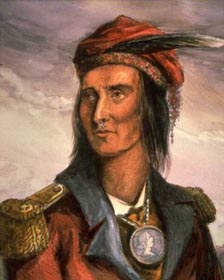
Tecumseh
NAME: Tecumseh ("panther passing across")
BORN: (March?) 1768
COMMUNITY AFFILIATIONS: Old Piqua, (Greene County)
OCCUPATION: Shawnee Leader
DIED October 5, 1813, Battle of the Thames
FAST FACTS:
Tecumseh's father, Pucksinwa, was killed at the Battle of Point Pleasant in 1774. By 1808, Tecumseh was a Shawnee chief. He led his people to a settlement on the Wabash River near the mouth of the Tippecanoe.
Early in life, he developed a strong anger towards European encroachment. Tecumseh argued that no sale of land to whites was really valid without consent from ALL tribes. This argument was based on the language of the Greenville Treaty of 1795. With the assistance of his brother Tenskwatawa (The Prophet), he had some success in uniting various tribes against U.S. expansion. He also had the support of the British in Canada. On November 7, 1811, Tenskwatawa and his followers were defeated at the Battle at Tippecanoe. Tecumseh had warned his brother to avoid conflict until the their forces were strong and united, but to no avail. The confederation of tribes started to fall apart after the defeat.
During the War of 1812, Tecumseh closely aligned himself with the British. He actually attained the rank of brigadier general in the British army. His forces assisted with capture of Detroit and fought at Fort Meigs, Fort Stephenson, and Brownstown. Although an enemy of frontier Americans, Tecumseh was widely respected for his honor in battle and the mercy he showed towards his captives.
American naval victories on Lake Erie under Admiral Oliver Hazard forced a general retreat of British forces. Tecumseh chose to cover the retreat and was killed at the Battle of the Thames. The Shawnee peoples were forced to relocate west of the Mississippi River in 1827.

